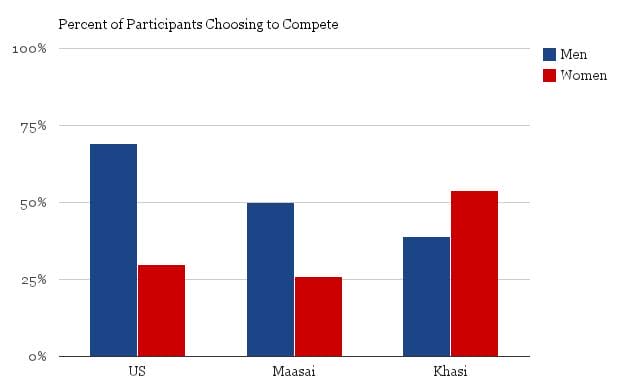
A series of studies have found that women in the US are less likely than men to negotiate their salaries or take jobs where individual competition determines wages. Maybe women are not as inclined as men to claw their way up the ranks. This could contribute to the statistic that women earn 77 cents for every dollar a man makes.
However, research by economists Uri Gneezy and John List suggests that negotiating for wages is highly dependent on culture. Today, only 4.2% of Fortune 500 CEOs are women. But, if that number were reversed, it might be women that negotiate harder than men for higher salaries.
More generally, Gneezy and List argue the drive to compete is not biologically determined. Their study was to compare the outcome of a game of competition in a patriarchal society (Maasai tribe of Tanzania ) and a matrilineal one (Khasi tribe of northeast India where names are passed down from the mother’s side).
Gneezy and List found that the men of the Maasai tribe dominated their society. When asked how many children they had, men often only listed their sons, and not their daughters. In the words of one tribeswoman, the Maasai men treated women like “chattel.”
However, when the two economists visited the Khasi tribe, they quickly realized that the women ran the show. In this matrilineal tribe, women held power over property rights, marriage, and economic opportunities. Some Khasi men felt marginalized by their role as “breeding bulls and babysitters.” Gneezy and List wondered how male and female competitiveness would look like in this parallel universe where women ran the world.
These researchers asked the Maasai and the Khasi people to play a simple game: toss 10 tennis balls into a bucket. For those who wanted to play the game, Gneezy and List gave them two options: either earn $1.50 for each ball successfully tossed into a bucket OR earn $4.50 for each successful toss if you got more balls in the bucket than a randomly selected opponent. In other words, would you rather play alone or play competitively?

Data via Psychology Today
50% of the men from the patriarchal Maasai tribe chose to compete, as compared to only 26% of the women. These results aligned fairly well with what Gneezy and List found in a similar experiment in the US, where 69% of men versus 30% of women chose to compete. In patriarchal societies, it comes as no surprise that men appear to be more competitively inclined than women.
How about in a female-dominated society? Would men still maintain a competitive edge over women? Nope. In the matrilineal Khasi tribe, 54% of the women chose to compete versus 39% of men.
Gneezy’s and List’s study suggests that culture, not natural aptitude, shapes competitiveness. And in the United States, it may be cultural influences that discourage women from pursuing higher salaries. At least according to this one study involving throwing balls into buckets.
To get occasional notifications when we write blog posts, sign up for our email list.



